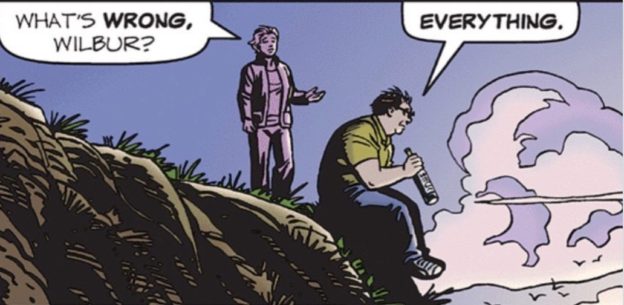Bernard Welt
I think everyone knows what I mean by “heartbreak.”
Has everyone experienced it? Is it an abstract concept to some people? Something they’ve heard about in songs and movies? Something they aspire to?
Even an imagined heartbreak can take over your life. You can spend your life chasing after the resolution of an imbalance that has no real existence.
Not everyone feels pain the same way. It’s like that thing people say about colors—Is my “blue” your “blue”? What do you feel? How do I know you’re feeling it? People want to think that some people have no feelings to hurt. It’s not true. What it is, is, some people have no idea what “hurt” feels like to others.
You know, you can get all philosophical and ask how you even know other people exist. But there is no reason to question the existence of other people that is not also an argument for questioning your own existence.
I’m going to have to assume you have some idea what I’m talking about, I guess. It’s really not necessary, though. I mean, it doesn’t matter. If we could just sit here for just a few minutes—really, I wouldn’t mind a couple of minutes to just catch my breath—that would be just as good. I don’t need to be understood.
If you felt like patting my head and calling me a good boy, that’d be great.
One thing that bothers me a lot is that nobody seems to know what’s coming next. I’ve always been consumed with this problem: future me in relation to me now, me yesterday. Me now; same me tomorrow? Me no know. No, no.
It was a beautiful country. There was enough for everyone. The food was as beautiful to look at as to eat. The people loved each other, and loved loving. The people looked out for each other. They delighted in a general state of universal approval. They rejoiced in one another’s joys; they commiserated in their misery. They had enough. They didn’t need anything more.
Then the sun set. You know how that is. It got dark. It got cold. It got . . . hostile. There wasn’t enough. Fucking massive headache, is what it was.
In certain eras, musical style and idiom change dramatically. This doesn’t happen gradually, but all at once. I mean, there are signs, but—suddenly everything is different. What happens is, what was once at the margins, what was excluded as meaningless, as offensive, as noise, just becomes—well, what people think of as music. Sometimes it speeds up; sometimes it slows down. Sometimes the range expands; sometimes it narrows. The learned give way to the amateurs; the amateurs have to cede their places to the learned.
It seems strange that more people don’t notice this.
Do you want to be treated well? Do you have any idea what would make you happy? Would you like some money—let’s say, oh, $100? How about a swift kick in the pants?
It remains for the artists to put into words, or images, or sound, whatever it was that everyone wasn’t aware they were noticing–but once it was said—or shown, or played—everyone was, like, Oh yeah. That.
Artists and your mother. Your mother always knows.
Funny thing: I really believe those folks who say that time is an illusion. That it’s really in our heads, not “out there”. Under certain circumstances, we can actually perceive how we project a past and a future into our perception of the present. How this moment becomes that, and that had to be before this could. And more complexly: How from present and future we concoct beginning and end.
But there is no beginning.
There is no end.
Whatever we are in process of doing now, has long ago been resolved.
Sorry, that’s just how is. The physicists said so. Go argue with them.
What we do now we have done forever.
What we do, we will do until time folds back on itself. And even then, we will keep on doing it.
Maybe we better be careful what we do.
